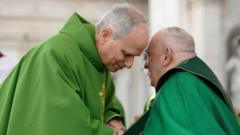As Cardinal Prevost takes on the title of Pope Leo XIV, the historical ties to Pope Leo XIII highlight an intention to address contemporary challenges while recalling valuable lessons from the past.
The Legacy of Pope Leo XIV: Bridging Tradition and Modernity

The Legacy of Pope Leo XIV: Bridging Tradition and Modernity
Cardinal Robert Francis Prevost's selection of the papal name Leo XIV hints at a renewed focus on social issues akin to his predecessor, Leo XIII.
In a notable move reflecting both tradition and modern sensibilities, Cardinal Robert Francis Prevost has chosen the name Pope Leo XIV upon his ascent to the papacy. This naming decision appears to be a purposeful nod to the legacy of Pope Leo XIII, who served from 1878 to 1903 and is acclaimed for steering the church towards a more modern and socially conscious stance.
Pope Leo XIII is remembered for his influential 1891 encyclical “Rerum Novarum,” which championed workers' rights and called for fair wages in response to the industrial revolution's challenges. His efforts established him as the "pope of the workers," fostering a bridge between the church's earlier, more traditional role and its evolving responsibilities in the face of modern societal issues.
In comments made by Matteo Bruni, a Vatican spokesman, the name Leo XIV recognition signifies a strategic connection between the past and future leadership of the church. It suggests that like his namesake, the new pope may focus on the pressing needs of working-class communities while advocating for social justice in present-day society.
Scholars, such as David I. Kertzer from Brown University, have emphasized Leo XIII's unique place in papal history—a conservative leader embracing a moderate approach toward the burgeoning challenges of capitalism and socialism of his time. Kertzer noted that Leo XIII sought to create a rapport between labor and capital, making his leadership relevant as the church encounters similar themes today.
Furthermore, Professor Robert Orsi from Northwestern University highlighted that adopting the name Leo XIV may indicate the new pope's commitment to addressing contemporary social issues with authority and compassion, akin to the engagement demonstrated by Leo XIII.
This chosen name thus echoes the duality of maintaining respect for tradition while also advocating for progress, indicating a potential path for pope Leo XIV that resonates with the historical imperatives laid by his predecessor while responding to today's socio-economic realities.




















